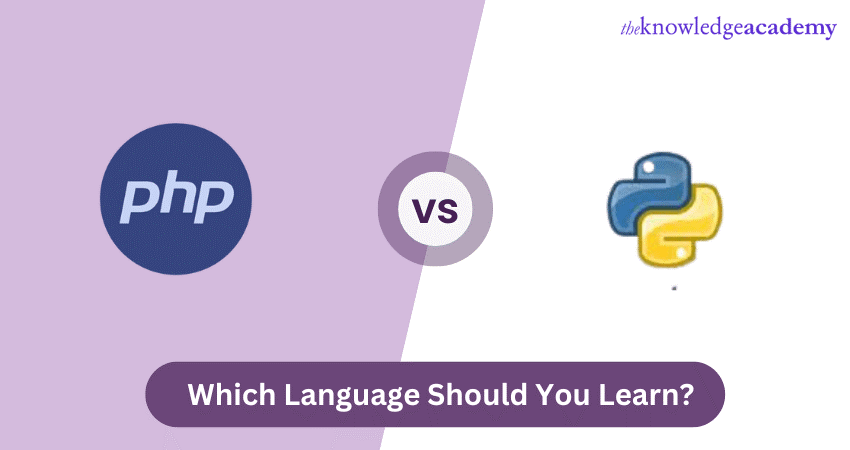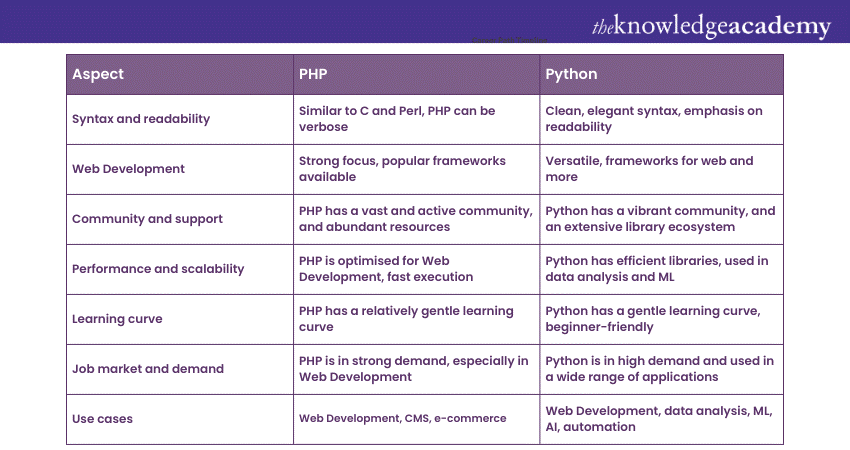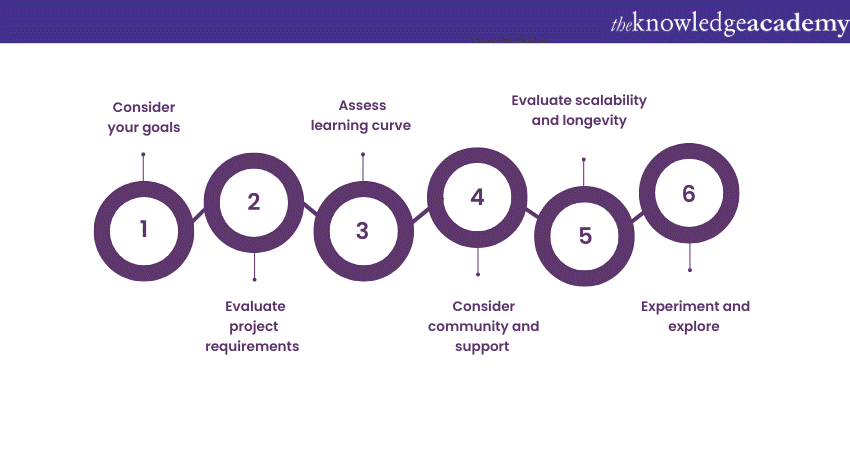We may not have the course you’re looking for. If you enquire or give us a call on 01344203999 and speak to our training experts, we may still be able to help with your training requirements.
We ensure quality, budget-alignment, and timely delivery by our expert instructors.

Programming languages play a crucial role in Web Development in the modern digital era. Two popular languages for Web Development and beyond are PHP and Python. Both languages have their own strengths and weaknesses, making it essential to understand the key differences before deciding which one to learn. Therefore, you should always have a clear picture of PHP vs Python before choosing your language.
According to Glassdoor, PHP Developers in the United Kingdom earn an average salary of around £42,000. On the other hand, a Python Developer earns an average annual salary of around $58,000. The prevalence of both languages as well as the lucrative packages on offer, make professionals enquire about which language to learn. This blog provides an in-depth comparison of PHP vs Python, helping you decide which one to focus on. Additionally, if you're curious about how PHP compares to HTML in terms of functionality and usage, check out our detailed guide on PHP vs HTML.
Table of Contents
1) What is PHP?
2) What is Python?
3) PHP vs Python: Key differences
a) Syntax and readability
b) Web Development
c) Community and support
d) Performance and scalability
e) Learning curve
f) Job market and demand
g) Use cases
4) PHP vs Python: How to choose the right language?
5) Conclusion
What is PHP?
Before delving into a detailed comparison of Python vs PHP, we will first define both – beginning with the latter. PHP, short for Hypertext Preprocessor, is a server-side scripting language primarily used for Web Development. It is widely adopted and powers numerous websites and web applications. PHP is known for its simplicity, versatility, and extensive support for database integration. It is compatible with various web servers and operating systems, making it highly accessible. PHP Interview Questions often cover these fundamental aspects of the language.
Want to master PHP Programming and build dynamic websites? Join our PHP Programming Training Course now!
What is Python?
Python is a versatile, high-level programming language known for its readability and ease of use. It offers a variety of applications, from Web Development to data analysis and artificial intelligence. Python's clean syntax and comprehensive standard library contribute to its popularity among developers. It prioritises simplicity and encourages code readability, which aids in maintaining and scaling projects.
Enhance your programming skills with our Python Programming Training Course – sign up now!
PHP vs Python: Key differences
This section of the blog will delve into a detailed comparison of PHP vs Python based on several aspects.

Syntax and readability
The most notable difference between PHP and Python lies in their syntax and readability. PHP follows a syntax that is similar to C and Perl, making it relatively easy for developers familiar with these languages to learn PHP. However, PHP's syntax, especially when working with complex structures like PHP arrays, can be considered less clean and more verbose compared to Python.
On the other hand, Python is renowned for its clean and elegant syntax. Its code structure is based on indentation, which not only enforces consistent formatting but also improves code readability. Python's syntax is often referred to as "beautiful" by developers, as it emphasises code readability and simplicity.
Web Development
PHP has long been recognised as a leading language for Web Development. With a variety of frameworks—such as Laravel, Symfony, and CodeIgniter—it streamlines the process of web application development. Exploring Laravel vs Symfony can help developers choose the right tool for their needs. PHP's primary focus on server-side scripting, database integration, and powerful functions like PHP strpos() for string manipulation makes it an ideal choice for building dynamic websites, content management systems (CMS), and e-commerce platforms. PHP's extensive support for databases like MySQL and PostgreSQL further solidifies its position in the Web Development landscape.
Python, while also capable of Web Development, offers a broader range of applications beyond just Web Development. Python frameworks like Django and Flask provide powerful tools for building web applications and APIs. However, Python's versatility extends to other domains, such as data analysis, scientific computing, artificial intelligence, and automation. With Python, developers have the flexibility to work on a diverse set of projects, not just limited to Web Development.
Community and support
The strength of a programming language's community and the availability of resources are crucial factors for developers. PHP has a vast and active community with numerous online resources, tutorials, and forums. The PHP community ensures continuous support, regular updates, and a wealth of knowledge-sharing. The abundance of PHP-related resources makes it easy for developers to find solutions to their coding challenges and stay updated with the latest trends and best practices in Web Development.
Python also boasts a robust community driven by passionate developers from various backgrounds. The Python community is known for its inclusivity, openness, and willingness to help newcomers. The community actively contributes to an extensive library of modules and packages, making Python a versatile language for different domains. Moreover, Python's community is not limited to Web Development but also extends its support to scientific computing, data analysis, machine learning, and automation. The availability of comprehensive documentation and active community forums ensures that developers can find the assistance they need and foster collaboration among fellow Python enthusiasts.
Performance and scalability
Performance is another important aspect to consider when comparing PHP and Python. PHP is specially designed for Web Development, and it performs exceptionally well in this domain. It is optimised for server-side scripting and delivers fast execution times, especially when combined with caching mechanisms. However, when it comes to complex computations or heavy data processing tasks, PHP may face limitations in terms of performance.
On the other hand, Python's performance is highly dependent on the specific use case and the libraries employed. Python's interpreted nature might lead some to assume that it is slower than PHP. However, Python has an array of efficient libraries and implementations that enable it to perform exceptionally well. In fact, Python is widely used in data-intensive tasks, scientific computing, and machine learning. Python's scalability is further enhanced by frameworks like TensorFlow and PyTorch, which support distributed computing and parallel processing.
Learning curve
The learning curve refers to the difficulty or ease of acquiring proficiency in a programming language. When it comes to PHP, the learning curve is generally considered to be relatively gentle, particularly for those already familiar with C-style syntax or other procedural languages. PHP's syntax is intuitive and straightforward, making it accessible to beginners. Additionally, PHP has extensive documentation, abundant online resources, and an active community that provides support and guidance to newcomers.
Python, on the other hand, is renowned for its simplicity and readability. Its clean and elegant syntax, along with its emphasis on code readability, contributes to a gentle learning curve. Python's syntax is often described as being closer to natural language, making it beginner-friendly and easy to understand. The availability of comprehensive documentation, tutorials, and an enthusiastic community further facilitates the learning process for aspiring Python Developers.
Job market and demand
The job market demand for programming languages is an important consideration for aspiring developers. In terms of PHP, it continues to be widely used and has a strong presence in the job market. PHP's popularity stems from its dominance in Web Development, particularly for building dynamic websites, content management systems (CMS), and e-commerce platforms. Many established websites and popular CMS platforms, such as WordPress, rely heavily on PHP. Consequently, there is a consistent demand for skilled PHP Developers who can build and maintain web applications.
Python, on the other hand, has experienced tremendous growth in recent years and has gained popularity across multiple domains. The job market demand for Python Developers is high and continues to rise. Python's versatility and extensive library ecosystem have contributed to its widespread adoption. Python is used not only in Web Development but also in data analysis, scientific computing, machine learning, artificial intelligence, automation, and more. The demand for Python Developers is particularly strong in the domains of data science, where Python's libraries, such as NumPy, Pandas, and scikit-learn, are widely utilised.
Use cases
While PHP is primarily associated with Web Development, Python's applications extend beyond the web. PHP excels in scenarios that require server-side scripting and database integration, making it a popular choice for developing dynamic websites, CMS, and e-commerce platforms. Its seamless integration with databases and extensive support for web-related functionalities make PHP a go-to language for web developers.
On the other hand, Python's versatility allows it to be used in various domains. Apart from Web Development, Python is widely employed in data analysis, scientific computing, machine learning, artificial intelligence, and automation. Python's clean syntax, rich library ecosystem, and ease of use make it an excellent choice for developers who want to explore a broader range of projects and applications.
PHP vs Python: How to choose the right language?
When embarking on a programming journey, choosing the right language is a crucial decision. With a myriad of programming languages available, selecting the one that aligns with your goals, project requirements, and personal preferences is essential. To make the right choice, consider some key aspects like the following:

Consider your goals
Before diving into any programming language, it is vital to identify your goals and aspirations as a developer. Are you interested in Web Development, data analysis, mobile app development, or machine learning? Each programming language has its strengths and specialities. For example, if your goal is to become a web developer, languages like JavaScript, PHP, or Python may be suitable choices. Comprehending your goals will help narrow down the options and guide you towards the language that aligns with your desired career path.
Evaluate project requirements
When selecting a programming language, carefully evaluate the requirements of your project. Consider the scope, complexity, and specific functionalities you need to implement. For example, if you are developing a web application that requires robust server-side scripting and database integration, PHP might be a good fit. On the other hand, if you are working on a project that involves data analysis, machine learning, or scientific computing, Python's extensive library ecosystem and data processing capabilities make it a suitable choice.
Assess learning curve
Consider your familiarity with programming concepts and your learning preferences. Some languages have steeper learning curves, while others are more beginner-friendly. If you are new to programming, it is advisable to choose a language with a gentle learning curve. Python, for example, is known for its simplicity and readability, making it an optimal choice for beginners. PHP also has a relatively straightforward syntax, particularly for those already familiar with C-style languages.
Consider community and support
The strength of a programming language's community and the availability of support resources are vital for developers. A vibrant community provides opportunities for learning, collaboration, and problem-solving. Consider the size, activity level, and accessibility of the community associated with your chosen language.
Evaluate scalability and longevity
While it may be tempting to choose a language solely based on current trends, it is important to evaluate its scalability and long-term viability. Consider the language's adoption rate, industry usage, and whether it has a history of successful projects. A language that is widely adopted and has an established ecosystem is more likely to have better long-term support, libraries, and frameworks. It is also important to assess the language's evolution and its compatibility with emerging technologies.
Experiment and explore
Finally, don't be afraid to experiment and explore different programming languages. Building a strong foundation in one language often facilitates learning others in the future. By being open to new experiences, you can broaden your skill set and adapt to diverse project requirements.

Conclusion
In the PHP vs Python debate, there is no definitive answer to which language is better. Each language has its strengths and areas of expertise. PHP is well-suited for Web Development, particularly when it comes to server-side scripting and database integration. Python, on the other hand, offers versatility and broader applications, ranging from Web Development to data analysis and artificial intelligence. Ultimately, the choice between PHP and Python depends on your specific goals, project requirements, and personal preferences.
Unlock your coding potential with our Computer Programming Courses. Sign up today and embark on your journey to becoming a skilled programmer!
Upcoming Programming & DevOps Resources Batches & Dates
Date
 PHP Course
PHP Course
Thu 15th May 2025
Thu 10th Jul 2025
Thu 11th Sep 2025
Thu 13th Nov 2025






 Top Rated Course
Top Rated Course


 If you wish to make any changes to your course, please
If you wish to make any changes to your course, please


